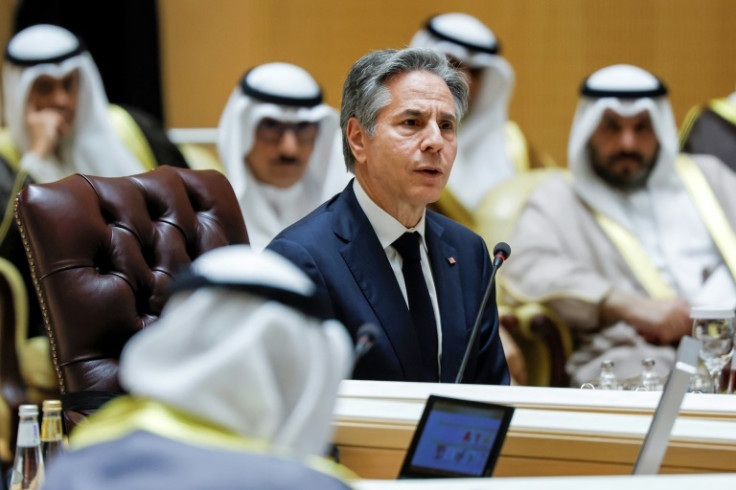Blinken Promotes Gulf Arab Defence In Sign To Israel And Iran

US Secretary of State Antony Blinken called Monday for tighter defense integration among Gulf Arabs in response to Iran, part of efforts to encourage moderation by Israel by dangling the prospect of better ties with the region.
Blinken was starting his seventh visit to the Middle East since the October 7 Hamas attacks on Israel, which has responded with a relentless military campaign in the Gaza Strip that has brought growing public pressure for a ceasefire.
It is Blinken's first trip to the region since the long shadow war between Israel and Iran broke out into the open, which included the Islamic republic firing missiles and armed drones at military sites in Israel.
"This attack highlights the acute and growing threat from Iran but also the imperative that we work together on integrated defence," Blinken told Gulf Cooperation Council ministers meeting in Riyadh.
Blinken said the United States would hold talks in the coming weeks with the six-nation bloc on integrating air and missile defence and boosting maritime security.
The United States already has strong military relations with all the Gulf Arab states, but relations among the six have seen their ups and downs.
Blinken said that the region had a choice on its future, including "one ridden with divisions and destruction and violence and permanent instability".
Gulf Arabs, through their meeting with the United States, were choosing "greater integration" and "greater peace", he said.
Israel, which has long warned against Iran, on April 1 carried out a purported strike in Syria that levelled an Iranian diplomatic building, killing members of the elite Revolutionary Guards including two generals.
Iran responded with its attack and Israel in turn was suspected to have carried out a subsequent strike inside central Iran.
US officials privately say that they expect the escalatory cycle to be over for now, with both adversaries making their points without inflicting major damage or casualties.
Two Gulf Arab nations -- the United Arab Emirates and Bahrain -- have recognised Israel but the United States has been pushing a bigger prize: Saudi Arabia, the guardian of Islam's two holiest sites.
Blinken was expected to meet later Monday with Saudi Arabia's de facto ruler, Crown Prince Mohammed bin Salman, to seek to push forward normalisation.
Washington has hoped to use the prospect of Saudi ties to encourage compromise by Israeli Prime Minister Benjamin Netanyahu, a longtime foe of a Palestinian state who has also sought to highlight his role in building relations with the Arab world.
Qatar has played a key role in talks that aim to halt the fighting between Israel and Hamas and release hostages.
Opening the meeting, Qatar's prime minister and foreign minister, Mohammed bin Abdulrahman Al Thani, said the "international community's failure to find a solution to the Palestinian cause" presents one of the "most significant" challenges to regional security.
Blinken told the Gulf Arab nations that he would press for a Palestinian state and more humanitarian access into Gaza.
"The most effective way to address the humanitarian crisis in Gaza, to alleviate the suffering," Blinken said, "and to create space for a more just and durable solution, is to get a ceasefire and the hostages home."
Blinken, who will later head to Jordan and Israel, arrived hours after President Joe Biden and Netanyahu spoke by telephone about ceasefire talks.
Biden also reiterated concerns about Israel launching an operation in Rafah, the southern Gaza city where more than one million Palestinians have taken shelter.
© Copyright AFP 2024. All rights reserved.











